Answered step by step
Verified Expert Solution
Question
1 Approved Answer
I just want to conclude this topic. plz Introduction The world population faces unprecedented situations due to coronavirus (Covid-19), in which the first disease was
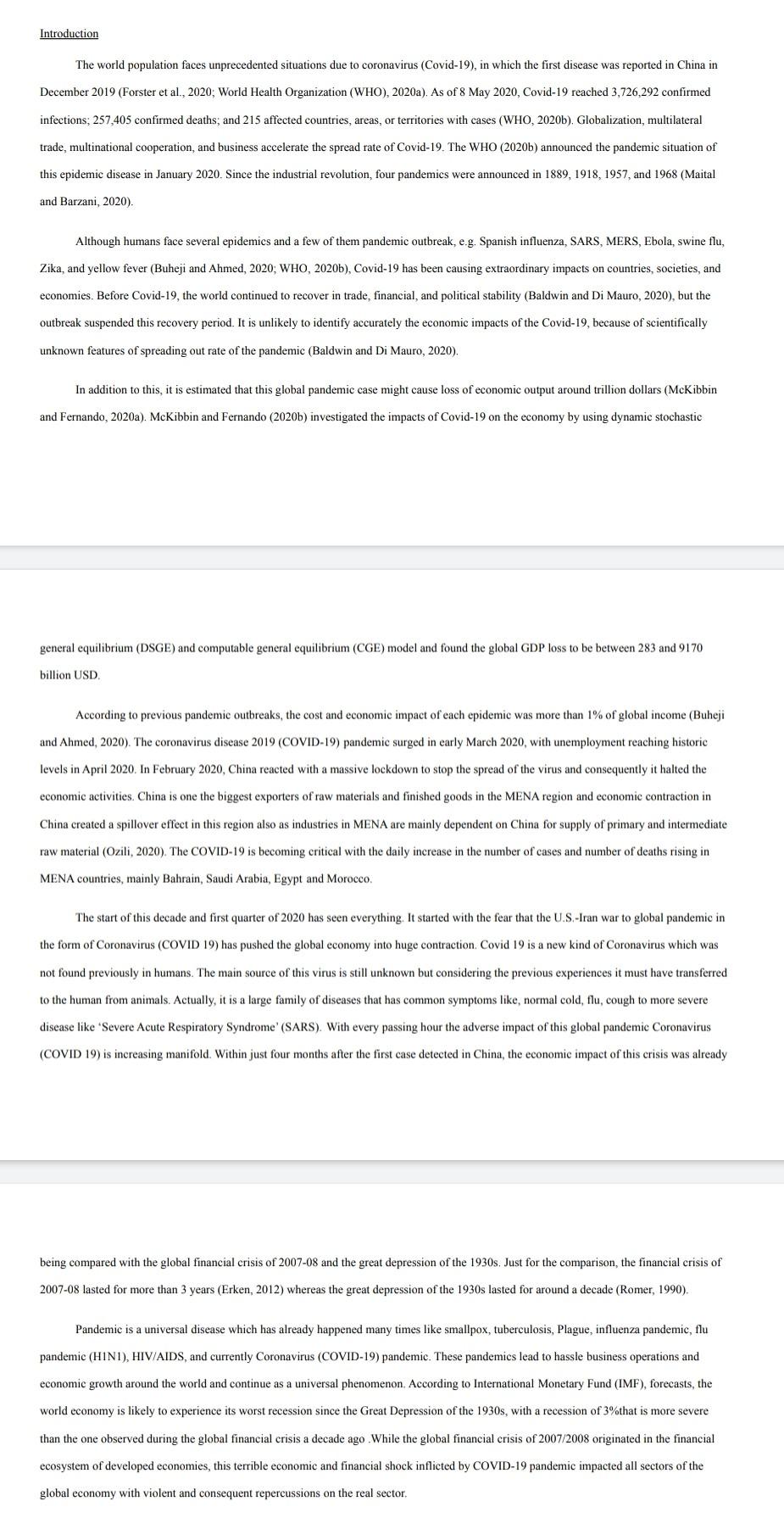
I just want to conclude this topic.
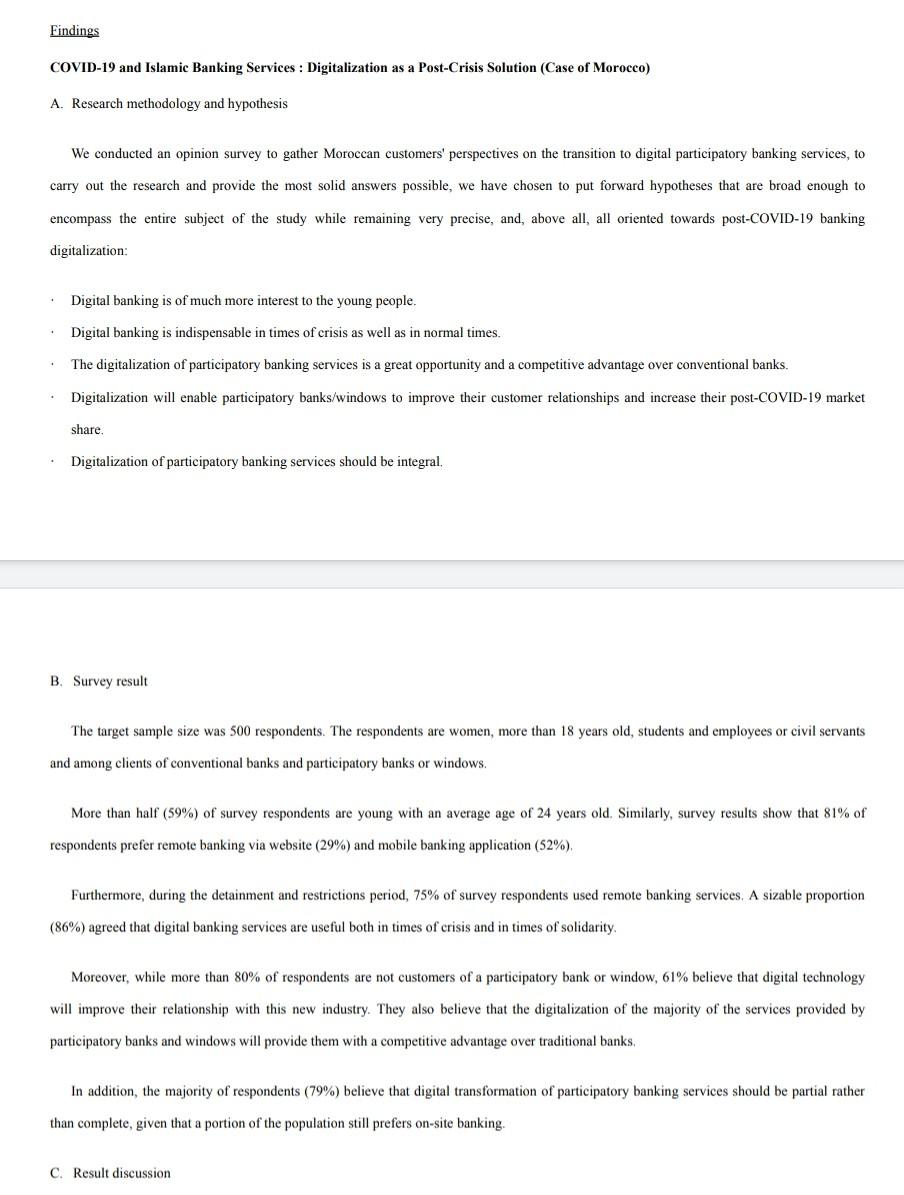
plz
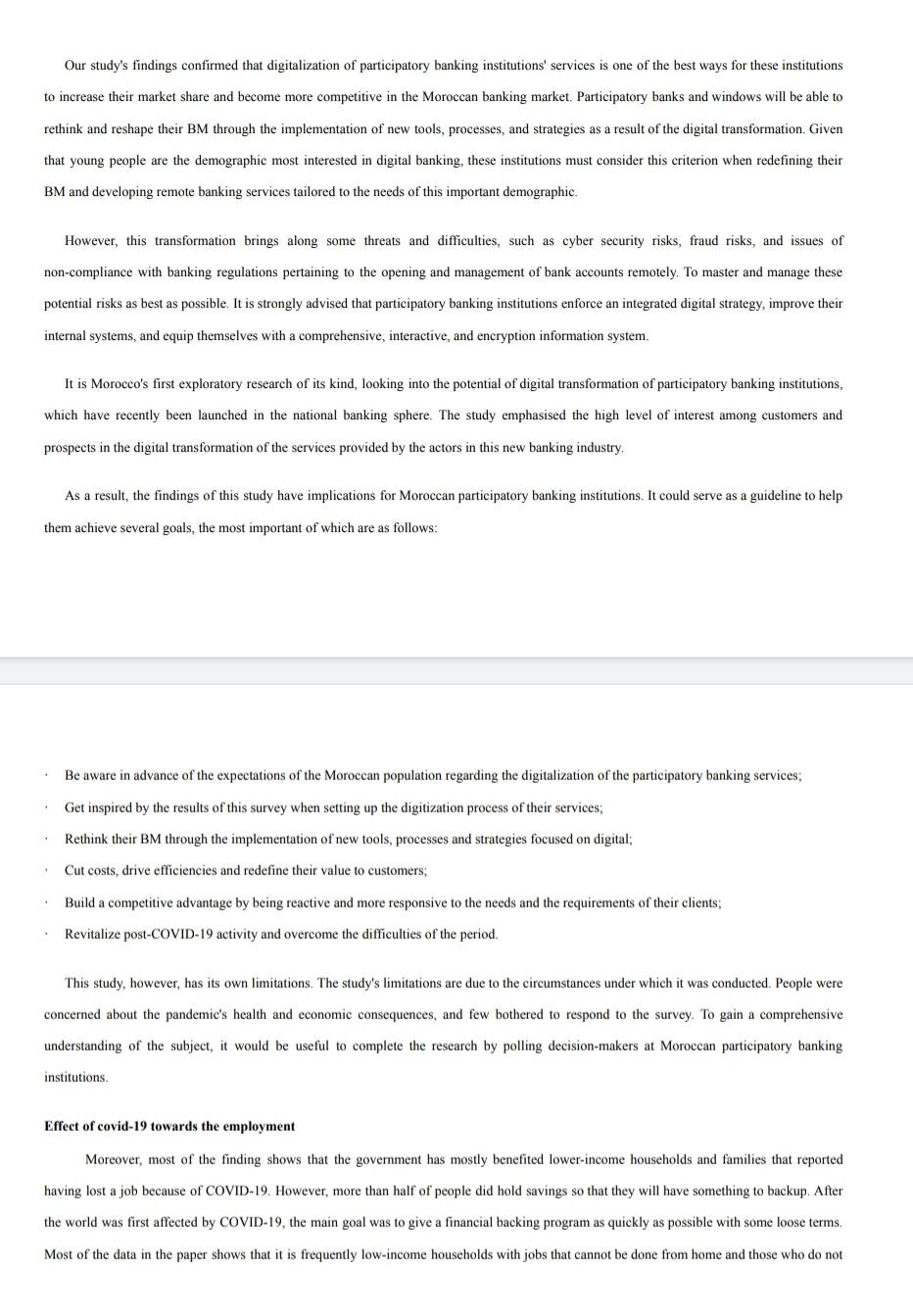
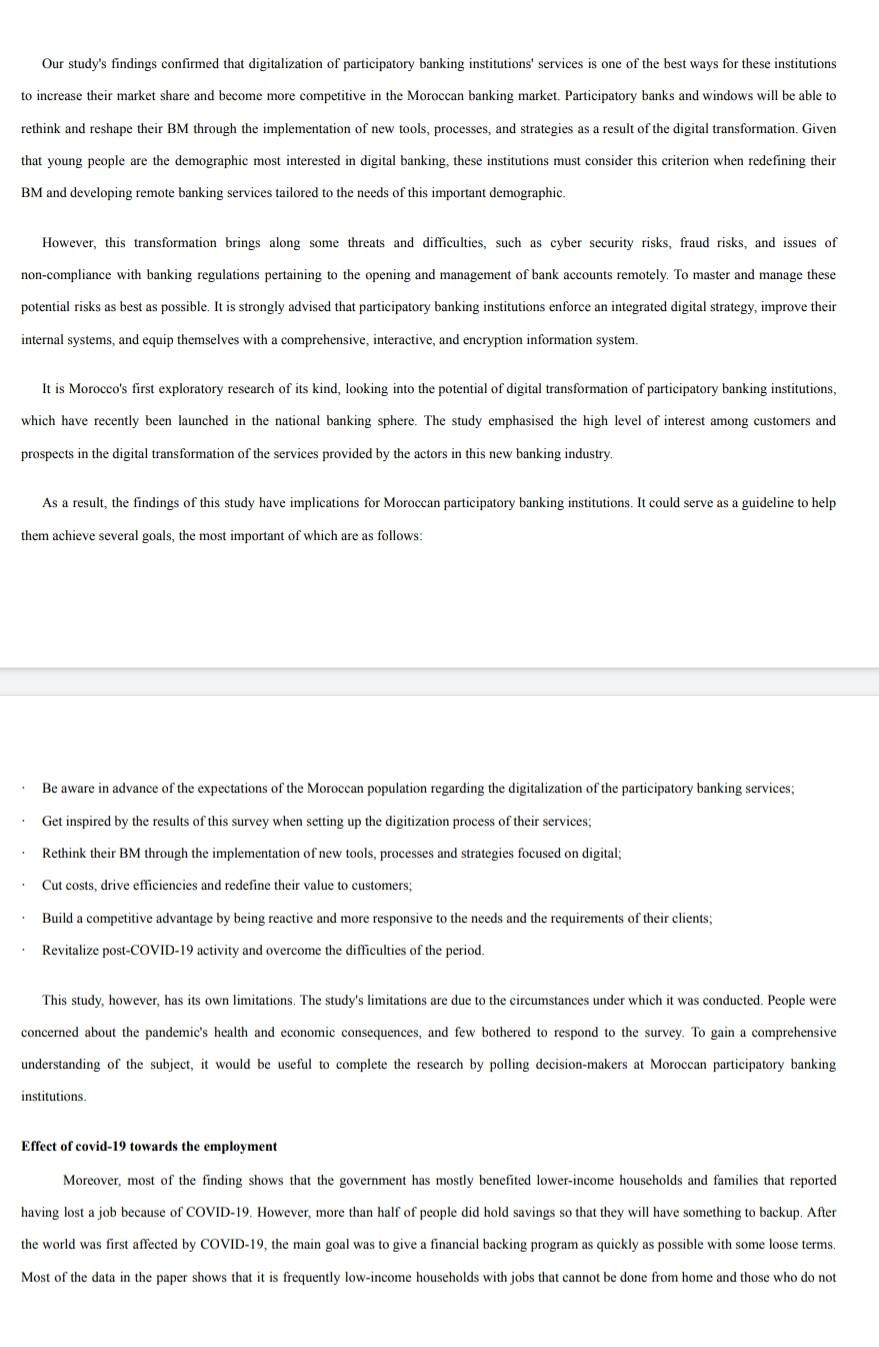
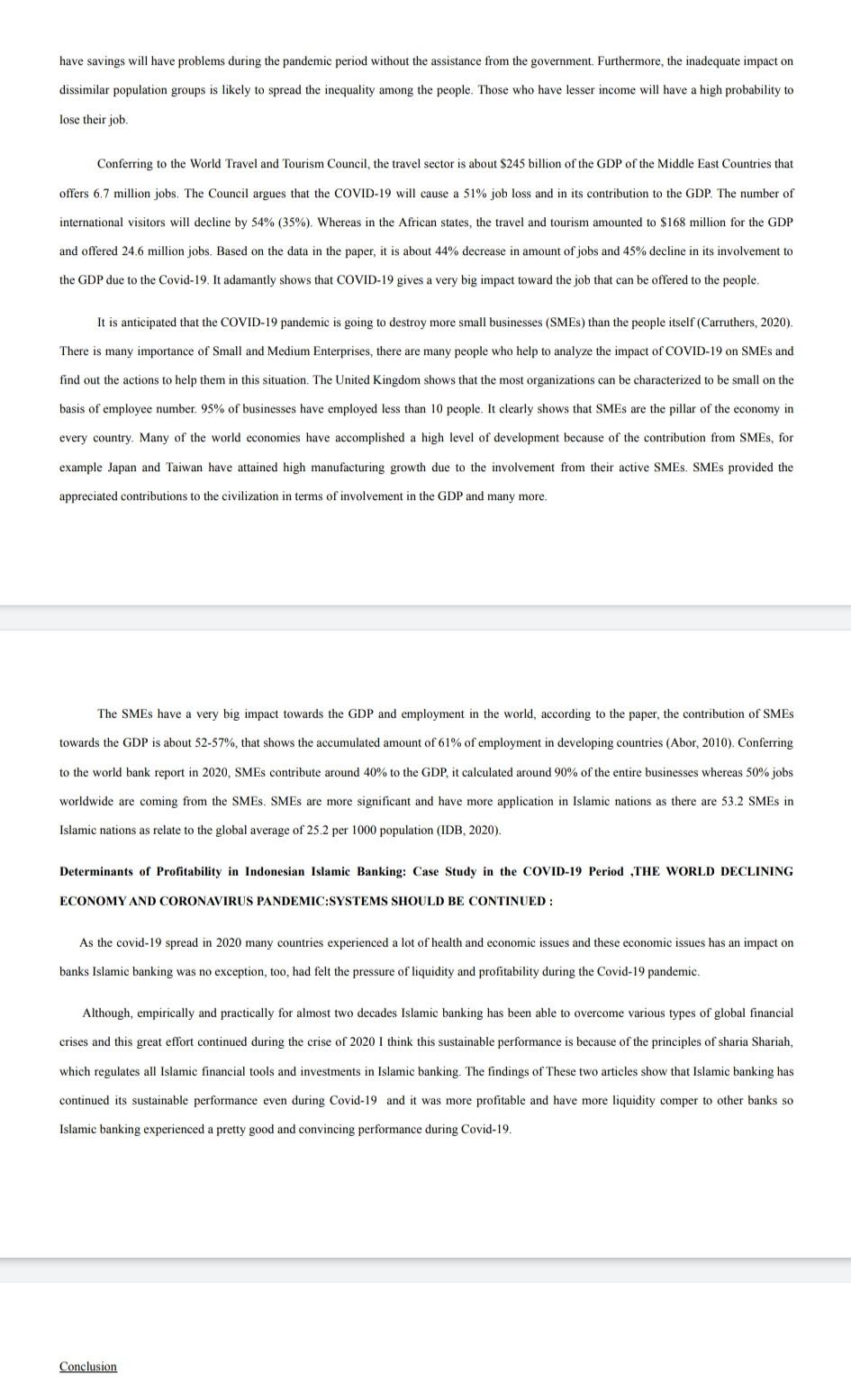
Introduction The world population faces unprecedented situations due to coronavirus (Covid-19), in which the first disease was reported in China in December 2019 (Forster et al., 2020; World Health Organization (WHO), 2020a). As of 8 May 2020, Covid-19 reached 3,726,292 confirmed infections, 257,405 confirmed deaths; and 215 affected countries, areas, or territories with cases (WHO, 2020b). Globalization, multilateral trade, multinational cooperation, and business accelerate the spread rate of Covid-19. The WHO (2020b) announced the pandemic situation of this epidemic disease in January 2020. Since the industrial revolution, four pandemics were announced in 1889, 1918, 1957, and 1968 (Maital and Barzani, 2020). Although humans face several epidemics and a few of them pandemic outbreak, e.g. Spanish influenza, SARS, MERS, Ebola, swine flu, Zika, and yellow fever (Buheji and Ahmed, 2020; WHO, 2020b), Covid-19 has been causing extraordinary impacts on countries, societies, and economies. Before Covid-19, the world continued to recover in trade, financial and political stability (Baldwin and Di Mauro, 2020), but the outbreak suspended this recovery period. It is unlikely to identify accurately the economic impacts of the Covid-19, because of scientifically unknown features of spreading out rate of the pandemic (Baldwin and Di Mauro, 2020). In addition to this, it is estimated that this global pandemic case might cause loss of economic output around trillion dollars (McKibbin and Fernando, 2020a). McKibbin and Fernando (2020b) investigated the impacts of Covid-19 on the economy by using dynamic stochastic general equilibrium (DSGE) and computable general equilibrium (CGE) model and found the global GDP loss to be between 283 and 9170 billion USD According to previous pandemic outbreaks, the cost and economic impact of each epidemic was more than 1% of global income (Buheji Ahmed, 2020). The coronavirus disease 2019 (COVID-19) pandemic surged early March 2020, with unemployment reaching historic levels in April 2020. In February 2020, China reacted with a massive lockdown to stop the spread of the virus and consequently it halted the economic activities, China is one the biggest exporters of raw materials and finished goods in the MENA region and economic contraction in China created a spillover effect in this region also as industries in MENA are mainly dependent on China for supply of primary and intermediate raw material (Ozili, 2020). The COVID-19 is becoming critical with the daily increase in the number of cases and number of deaths rising in MENA countries, mainly Bahrain, Saudi Arabia, Egypt and Morocco The start of this decade and first quarter of 2020 has seen everything. It started with the fear that the U.S.-Iran war to global pandemic in the form of Coronavirus (COVID 19) has pushed the global economy into huge contraction. Covid 19 is a new kind of Coronavirus which was not found previously in humans. The main source of this virus is still unknown but considering the previous experiences it must have transferred to the human from animals. Actually, it is a large family of diseases that has common symptoms like, normal cold, flu, cough to more severe disease like 'Severe Acute Respiratory Syndrome' (SARS). With every passing hour the adverse impact of this global pandemic Coronavirus (COVID 19) is increasing manifold. Within just four months after the first case detected in China, the economic impact of this crisis was already being compared with the global financial crisis of 2007-08 and the great depression of the 1930s. Just for the comparison, the financial crisis of 2007-08 lasted for more than years (Erken, 2012) whereas the great depression of the 1930s lasted for around a decade (Romer, 1990). Pandemic is a universal disease which has already happened many times like smallpox, tuberculosis, Plague, influenza pandemic, flu pandemic (H1N1), HIV/AIDS, and currently Coronavirus (COVID-19) pandemic. These pandemics lead to hassle business operations and economic growth around the world and continue as a universal phenomenon. According to International Monetary Fund (IMF), forecasts, the world economy is likely to experience its worst recession since the Great Depression of the 1930s, with a recession of 3%that is more severe than the one observed during the global financial crisis a decade ago. While the global financial crisis of 2007/2008 originated in the financial ecosystem of developed economies, this terrible economic and financial shock inflicted by COVID-19 pandemic impacted all sectors of the global economy with violent and consequent repercussions on the real sector. Findings COVID-19 and Islamic Banking Services: Digitalization as a Post-Crisis Solution (Case of Morocco) A. Research methodology and hypothesis We conducted an opinion survey to gather Moroccan customers' perspectives on the transition to digital participatory banking services, to carry out the research and provide the most solid answers possible, we have chosen to put forward hypotheses that are broad enough to encompass the entire subject of the study while remaining very precise, and, above all, all oriented towards post-COVID-19 banking digitalization Digital banking is of much more interest to the young people. Digital banking is indispensable in times of crisis as well as in normal times. The digitalization of participatory banking services is a great opportunity and a competitive advantage over conventional banks. Digitalization will enable participatory banks/windows to improve their customer relationships and increase their post-COVID-19 market share. Digitalization of banking rvices should be integral, B. Survey result The target sample size was 500 respondents. The respondents are women, more than 18 years old, students and employees or civil servants and among clients of conventional banks and participatory banks or windows. More than half (59%) of survey respondents are young with an average age of 24 years old. Similarly, survey results show that 81% of respondents prefer remote banking via website (29%) and mobile banking application (52%), Furthermore, during the detainment and restrictions period, 75% of survey respondents used remote banking services. A sizable proportion (86%) agreed that digital banking services are useful both in times of crisis and in times of solidarity Moreover, while more than 80% of respondents are not customers of a participatory bank or window, 61% believe that digital technology will improve their relationship with this new industry. They also believe that the digitalization of the majority of the services provided by participatory banks and windows will provide them with a competitive advantage over traditional banks, In addition, the majority of respondents (79%) believe that digital transformation of participatory banking services should be partial rather than complete, given that a portion of the population still prefers on-site banking. C. Result discussion Our study's findings confirmed that digitalization of participatory banking institutions' services is one of the best ways for these institutions to increase their market share and become more competitive in the Moroccan banking market. Participatory banks and windows will be able to rethink and reshape their BM through the implementation of new tools, processes, and strategies as a result of the digital transformation. Given that young people are the demographic most interested in digital banking, these institutions must consider this criterion when redefining their BM and developing remote banking services tailored to the needs of this important demographic. However, this transformation brings along some threats and difficulties, such as cyber security risks, fraud risks, and issues of non-compliance with banking regulations pertaining to the opening and management of bank accounts remotely. To master and manage these potential risks as best as possible. It is strongly advised that participatory banking institutions enforce an integrated digital strategy, improve their internal systems, and equip themselves with a comprehensive, interactive, and encryption information system. It is Morocco's first exploratory research of its kind, looking into the potential of digital transformation of participatory banking institutions, which have recently been launched in the national banking sphere. The study emphasised the high level of interest among customers and prospects in the digital transformation of the services provided by the actors in this new banking industry, As a result, the findings of this study have implications for Moroccan participatory banking institutions. It could serve as a guideline to help them achieve several goals, the most important of which are as follows: Be aware in advance of the expectations of the Moroccan population regarding the digitalization of the participatory banking services, Get inspired by the results of this survey when setting up the digitization process of their services; Rethink their BM through the implementation of new tools, processes and strategies focused on digital; Cut costs, drive efficiencies and redefine their value to customers Build a competitive advantage by being reactive and more responsive to the needs and the requirements of their clients, Revitalize post-COVID-19 activity and overcome the difficulties of the period. This study, however, has its own limitations. The study's limitations are due to the circumstances under which it was conducted. People were concerned about the pandemic's health and economic consequences, and few bothered to respond to the survey. To gain a comprehensive understanding of the subject, it would be useful to complete the research by polling decision-makers at Moroccan participatory banking institutions Effect of covid-19 towards the employment Moreover, most of the finding shows that the government has mostly benefited lower-income households and families that reported having lost a job because of COVID-19. However, more than half of people did hold savings so that they will have something to backup. After the world was first affected by COVID-19, the main goal was to give a financial backing program as quickly as possible with some loose terms. Most of the data in the paper shows that it is frequently low-income households with jobs that cannot be done from home and those who do not Our study's findings confirmed that digitalization of participatory banking institutions' services is one of the best ways for these institutions to increase their market share and become more competitive in the Moroccan banking market. Participatory banks and windows will be able to rethink and reshape their BM through the implementation of new tools, processes, and strategies as a result of the digital transformation. Given that young people are the demographic most interested in digital banking, these institutions must consider this criterion when redefining their BM and developing remote banking services tailored to the needs of this important demographic. However, this transformation brings along some threats and difficulties, such as cyber security risks, fraud risks, and issues of non-compliance with banking regulations pertaining to the opening and management of bank accounts remotely. To master and manage these potential risks as best as possible. It is strongly advised that participatory banking institutions enforce an integrated digital strategy, improve their internal systems, and equip themselves with a comprehensive, interactive, and encryption information system. It is Morocco's first exploratory research of its kind, looking into the potential of digital transformation of participatory banking institutions, which have recently been launched in the national banking sphere. The study emphasised the high level of interest among customers and prospects in the digital transformation of the services provided by the actors in this new banking industry. As a result, the findings of this study have implications for Moroccan participatory banking institutions. It could serve as a guideline to help them achieve several goals, the most important of which are as follows: Be aware in advance of the expectations of the Moroccan population regarding the digitalization of the participatory banking services; Get inspired by the results of this survey when setting up the digitization process of their services, Rethink their BM through the implementation of new tools, processes and strategies focused on digital Cut costs, drive efficiencies and redefine their value to customers Build a competitive advantage by being reactive and more responsive to the needs and the requirements of their clients, Revitalize post-COVID-19 activity and overcome the difficulties of the period. This study, however, has its own limitations. The study's limitations are due to the circumstances under which it was conducted. People were concerned about the pandemic's health and economic consequences, and few bothered to respond to the survey. To gain a comprehensive understanding of the subject, it would be useful to complete the research by polling decision-makers at Moroccan participatory banking institutions Effect of covid-19 towards the employment Moreover, most of the finding shows that the government has mostly benefited lower-income households and families that reported having lost a job because of COVID-19. However, more than half of people did hold savings so that they will have something to backup. After the world was first affected by COVID-19, the main goal was to give a financial backing program as quickly as possible with some loose terms. Most of the data in the paper shows that it is frequently low-income households with jobs that cannot be done from home and those who do not have savings will have problems during the pandemic period without the assistance from the government. Furthermore, the inadequate impact on dissimilar population groups is likely to spread the inequality among the people. Those who have lesser income will have a high probability to lose their job. Conferring to the World Travel and Tourism Council, the travel sector is about $245 billion of the GDP of the Middle East Countries that offers 6.7 million jobs. The Council argues that the COVID-19 will cause a 51% job loss and in its contribution to the GDP. The number of international visitors will decline by 54% (35%). Whereas in the African states, the travel and tourism amounted to $168 million for the GDP and offered 24.6 million jobs. Based on the data in the paper, it is about 44% decrease in amount of jobs and 45% decline in its involvement to the GDP due to the Covid-19. It adamantly shows that COVID-19 gives a very big impact toward the job that can be offered to the people. It is anticipated that the COVID-19 pandemic is going to destroy more small businesses (SMEs) than the people itself (Carruthers, 2020). There is many importance of Small and Medium Enterprises, there are many people who help to analyze the impact of COVID-19 on SMEs and find out the actions to help them in this situation. The United Kingdom shows that the most organizations can be characterized to be small on the basis of employee number. 95% of businesses have employed less than 10 people. It clearly shows that SMEs are the pillar of the economy in every country. Many of the world economies have accomplished a high level of development because of the contribution from SMEs, for example Japan and Taiwan have attained high manufacturing growth due to the involvement from their active SMEs. SMEs provided the appreciated contributions to the civilization in terms of involvement in the GDP and many more. The SMEs have a very big impact towards the GDP and employment in the world, according to the paper, the contribution of SMEs towards the GDP is about 52-57%, that shows the accumulated amount of 61% of employment in developing countries (Abor, 2010). Conferring to the world bank report in 2020, SMEs contribute around 40% to the GDP, it calculated around 90% of the entire businesses whereas 50% jobs worldwide are coming from the SMEs. SMEs are more significant and have more application in Islamic nations as there are 53.2 SMEs in Islamic nations as relate to the global average of 25.2 per 1000 population (IDB, 2020). Determinants of Profitability in Indonesian Islamic Banking: Case Study in the COVID-19 Period ,THE WORLD DECLINING ECONOMY AND CORONAVIRUS PANDEMIC:SYSTEMS SHOULD BE CONTINUED : As the covid-19 spread in 2020 many countries experienced a lot of health and economic issues and these economic issues has an impact on banks Islamic banking was no exception, too, had felt the pressure of liquidity and profitability during the Covid-19 pandemic. Although, empirically and practically for almost two decades Islamic banking has been able to overcome various types of global financial crises and this great effort continued during the crise of 2020 I think this sustainable performance is because of the principles of sharia Shariah, which regulates all Islamic financial tools and investments in Islamic banking. The findings of These two articles show that Islamic banking has continued its sustainable performance even during Covid-19 and it was more profitable and have more liquidity comper to other banks so Islamic banking experienced a pretty good and convincing performance during Covid-19. Conclusion Introduction The world population faces unprecedented situations due to coronavirus (Covid-19), in which the first disease was reported in China in December 2019 (Forster et al., 2020; World Health Organization (WHO), 2020a). As of 8 May 2020, Covid-19 reached 3,726,292 confirmed infections, 257,405 confirmed deaths; and 215 affected countries, areas, or territories with cases (WHO, 2020b). Globalization, multilateral trade, multinational cooperation, and business accelerate the spread rate of Covid-19. The WHO (2020b) announced the pandemic situation of this epidemic disease in January 2020. Since the industrial revolution, four pandemics were announced in 1889, 1918, 1957, and 1968 (Maital and Barzani, 2020). Although humans face several epidemics and a few of them pandemic outbreak, e.g. Spanish influenza, SARS, MERS, Ebola, swine flu, Zika, and yellow fever (Buheji and Ahmed, 2020; WHO, 2020b), Covid-19 has been causing extraordinary impacts on countries, societies, and economies. Before Covid-19, the world continued to recover in trade, financial and political stability (Baldwin and Di Mauro, 2020), but the outbreak suspended this recovery period. It is unlikely to identify accurately the economic impacts of the Covid-19, because of scientifically unknown features of spreading out rate of the pandemic (Baldwin and Di Mauro, 2020). In addition to this, it is estimated that this global pandemic case might cause loss of economic output around trillion dollars (McKibbin and Fernando, 2020a). McKibbin and Fernando (2020b) investigated the impacts of Covid-19 on the economy by using dynamic stochastic general equilibrium (DSGE) and computable general equilibrium (CGE) model and found the global GDP loss to be between 283 and 9170 billion USD According to previous pandemic outbreaks, the cost and economic impact of each epidemic was more than 1% of global income (Buheji Ahmed, 2020). The coronavirus disease 2019 (COVID-19) pandemic surged early March 2020, with unemployment reaching historic levels in April 2020. In February 2020, China reacted with a massive lockdown to stop the spread of the virus and consequently it halted the economic activities, China is one the biggest exporters of raw materials and finished goods in the MENA region and economic contraction in China created a spillover effect in this region also as industries in MENA are mainly dependent on China for supply of primary and intermediate raw material (Ozili, 2020). The COVID-19 is becoming critical with the daily increase in the number of cases and number of deaths rising in MENA countries, mainly Bahrain, Saudi Arabia, Egypt and Morocco The start of this decade and first quarter of 2020 has seen everything. It started with the fear that the U.S.-Iran war to global pandemic in the form of Coronavirus (COVID 19) has pushed the global economy into huge contraction. Covid 19 is a new kind of Coronavirus which was not found previously in humans. The main source of this virus is still unknown but considering the previous experiences it must have transferred to the human from animals. Actually, it is a large family of diseases that has common symptoms like, normal cold, flu, cough to more severe disease like 'Severe Acute Respiratory Syndrome' (SARS). With every passing hour the adverse impact of this global pandemic Coronavirus (COVID 19) is increasing manifold. Within just four months after the first case detected in China, the economic impact of this crisis was already being compared with the global financial crisis of 2007-08 and the great depression of the 1930s. Just for the comparison, the financial crisis of 2007-08 lasted for more than years (Erken, 2012) whereas the great depression of the 1930s lasted for around a decade (Romer, 1990). Pandemic is a universal disease which has already happened many times like smallpox, tuberculosis, Plague, influenza pandemic, flu pandemic (H1N1), HIV/AIDS, and currently Coronavirus (COVID-19) pandemic. These pandemics lead to hassle business operations and economic growth around the world and continue as a universal phenomenon. According to International Monetary Fund (IMF), forecasts, the world economy is likely to experience its worst recession since the Great Depression of the 1930s, with a recession of 3%that is more severe than the one observed during the global financial crisis a decade ago. While the global financial crisis of 2007/2008 originated in the financial ecosystem of developed economies, this terrible economic and financial shock inflicted by COVID-19 pandemic impacted all sectors of the global economy with violent and consequent repercussions on the real sector. Findings COVID-19 and Islamic Banking Services: Digitalization as a Post-Crisis Solution (Case of Morocco) A. Research methodology and hypothesis We conducted an opinion survey to gather Moroccan customers' perspectives on the transition to digital participatory banking services, to carry out the research and provide the most solid answers possible, we have chosen to put forward hypotheses that are broad enough to encompass the entire subject of the study while remaining very precise, and, above all, all oriented towards post-COVID-19 banking digitalization Digital banking is of much more interest to the young people. Digital banking is indispensable in times of crisis as well as in normal times. The digitalization of participatory banking services is a great opportunity and a competitive advantage over conventional banks. Digitalization will enable participatory banks/windows to improve their customer relationships and increase their post-COVID-19 market share. Digitalization of banking rvices should be integral, B. Survey result The target sample size was 500 respondents. The respondents are women, more than 18 years old, students and employees or civil servants and among clients of conventional banks and participatory banks or windows. More than half (59%) of survey respondents are young with an average age of 24 years old. Similarly, survey results show that 81% of respondents prefer remote banking via website (29%) and mobile banking application (52%), Furthermore, during the detainment and restrictions period, 75% of survey respondents used remote banking services. A sizable proportion (86%) agreed that digital banking services are useful both in times of crisis and in times of solidarity Moreover, while more than 80% of respondents are not customers of a participatory bank or window, 61% believe that digital technology will improve their relationship with this new industry. They also believe that the digitalization of the majority of the services provided by participatory banks and windows will provide them with a competitive advantage over traditional banks, In addition, the majority of respondents (79%) believe that digital transformation of participatory banking services should be partial rather than complete, given that a portion of the population still prefers on-site banking. C. Result discussion Our study's findings confirmed that digitalization of participatory banking institutions' services is one of the best ways for these institutions to increase their market share and become more competitive in the Moroccan banking market. Participatory banks and windows will be able to rethink and reshape their BM through the implementation of new tools, processes, and strategies as a result of the digital transformation. Given that young people are the demographic most interested in digital banking, these institutions must consider this criterion when redefining their BM and developing remote banking services tailored to the needs of this important demographic. However, this transformation brings along some threats and difficulties, such as cyber security risks, fraud risks, and issues of non-compliance with banking regulations pertaining to the opening and management of bank accounts remotely. To master and manage these potential risks as best as possible. It is strongly advised that participatory banking institutions enforce an integrated digital strategy, improve their internal systems, and equip themselves with a comprehensive, interactive, and encryption information system. It is Morocco's first exploratory research of its kind, looking into the potential of digital transformation of participatory banking institutions, which have recently been launched in the national banking sphere. The study emphasised the high level of interest among customers and prospects in the digital transformation of the services provided by the actors in this new banking industry, As a result, the findings of this study have implications for Moroccan participatory banking institutions. It could serve as a guideline to help them achieve several goals, the most important of which are as follows: Be aware in advance of the expectations of the Moroccan population regarding the digitalization of the participatory banking services, Get inspired by the results of this survey when setting up the digitization process of their services; Rethink their BM through the implementation of new tools, processes and strategies focused on digital; Cut costs, drive efficiencies and redefine their value to customers Build a competitive advantage by being reactive and more responsive to the needs and the requirements of their clients, Revitalize post-COVID-19 activity and overcome the difficulties of the period. This study, however, has its own limitations. The study's limitations are due to the circumstances under which it was conducted. People were concerned about the pandemic's health and economic consequences, and few bothered to respond to the survey. To gain a comprehensive understanding of the subject, it would be useful to complete the research by polling decision-makers at Moroccan participatory banking institutions Effect of covid-19 towards the employment Moreover, most of the finding shows that the government has mostly benefited lower-income households and families that reported having lost a job because of COVID-19. However, more than half of people did hold savings so that they will have something to backup. After the world was first affected by COVID-19, the main goal was to give a financial backing program as quickly as possible with some loose terms. Most of the data in the paper shows that it is frequently low-income households with jobs that cannot be done from home and those who do not Our study's findings confirmed that digitalization of participatory banking institutions' services is one of the best ways for these institutions to increase their market share and become more competitive in the Moroccan banking market. Participatory banks and windows will be able to rethink and reshape their BM through the implementation of new tools, processes, and strategies as a result of the digital transformation. Given that young people are the demographic most interested in digital banking, these institutions must consider this criterion when redefining their BM and developing remote banking services tailored to the needs of this important demographic. However, this transformation brings along some threats and difficulties, such as cyber security risks, fraud risks, and issues of non-compliance with banking regulations pertaining to the opening and management of bank accounts remotely. To master and manage these potential risks as best as possible. It is strongly advised that participatory banking institutions enforce an integrated digital strategy, improve their internal systems, and equip themselves with a comprehensive, interactive, and encryption information system. It is Morocco's first exploratory research of its kind, looking into the potential of digital transformation of participatory banking institutions, which have recently been launched in the national banking sphere. The study emphasised the high level of interest among customers and prospects in the digital transformation of the services provided by the actors in this new banking industry. As a result, the findings of this study have implications for Moroccan participatory banking institutions. It could serve as a guideline to help them achieve several goals, the most important of which are as follows: Be aware in advance of the expectations of the Moroccan population regarding the digitalization of the participatory banking services; Get inspired by the results of this survey when setting up the digitization process of their services, Rethink their BM through the implementation of new tools, processes and strategies focused on digital Cut costs, drive efficiencies and redefine their value to customers Build a competitive advantage by being reactive and more responsive to the needs and the requirements of their clients, Revitalize post-COVID-19 activity and overcome the difficulties of the period. This study, however, has its own limitations. The study's limitations are due to the circumstances under which it was conducted. People were concerned about the pandemic's health and economic consequences, and few bothered to respond to the survey. To gain a comprehensive understanding of the subject, it would be useful to complete the research by polling decision-makers at Moroccan participatory banking institutions Effect of covid-19 towards the employment Moreover, most of the finding shows that the government has mostly benefited lower-income households and families that reported having lost a job because of COVID-19. However, more than half of people did hold savings so that they will have something to backup. After the world was first affected by COVID-19, the main goal was to give a financial backing program as quickly as possible with some loose terms. Most of the data in the paper shows that it is frequently low-income households with jobs that cannot be done from home and those who do not have savings will have problems during the pandemic period without the assistance from the government. Furthermore, the inadequate impact on dissimilar population groups is likely to spread the inequality among the people. Those who have lesser income will have a high probability to lose their job. Conferring to the World Travel and Tourism Council, the travel sector is about $245 billion of the GDP of the Middle East Countries that offers 6.7 million jobs. The Council argues that the COVID-19 will cause a 51% job loss and in its contribution to the GDP. The number of international visitors will decline by 54% (35%). Whereas in the African states, the travel and tourism amounted to $168 million for the GDP and offered 24.6 million jobs. Based on the data in the paper, it is about 44% decrease in amount of jobs and 45% decline in its involvement to the GDP due to the Covid-19. It adamantly shows that COVID-19 gives a very big impact toward the job that can be offered to the people. It is anticipated that the COVID-19 pandemic is going to destroy more small businesses (SMEs) than the people itself (Carruthers, 2020). There is many importance of Small and Medium Enterprises, there are many people who help to analyze the impact of COVID-19 on SMEs and find out the actions to help them in this situation. The United Kingdom shows that the most organizations can be characterized to be small on the basis of employee number. 95% of businesses have employed less than 10 people. It clearly shows that SMEs are the pillar of the economy in every country. Many of the world economies have accomplished a high level of development because of the contribution from SMEs, for example Japan and Taiwan have attained high manufacturing growth due to the involvement from their active SMEs. SMEs provided the appreciated contributions to the civilization in terms of involvement in the GDP and many more. The SMEs have a very big impact towards the GDP and employment in the world, according to the paper, the contribution of SMEs towards the GDP is about 52-57%, that shows the accumulated amount of 61% of employment in developing countries (Abor, 2010). Conferring to the world bank report in 2020, SMEs contribute around 40% to the GDP, it calculated around 90% of the entire businesses whereas 50% jobs worldwide are coming from the SMEs. SMEs are more significant and have more application in Islamic nations as there are 53.2 SMEs in Islamic nations as relate to the global average of 25.2 per 1000 population (IDB, 2020). Determinants of Profitability in Indonesian Islamic Banking: Case Study in the COVID-19 Period ,THE WORLD DECLINING ECONOMY AND CORONAVIRUS PANDEMIC:SYSTEMS SHOULD BE CONTINUED : As the covid-19 spread in 2020 many countries experienced a lot of health and economic issues and these economic issues has an impact on banks Islamic banking was no exception, too, had felt the pressure of liquidity and profitability during the Covid-19 pandemic. Although, empirically and practically for almost two decades Islamic banking has been able to overcome various types of global financial crises and this great effort continued during the crise of 2020 I think this sustainable performance is because of the principles of sharia Shariah, which regulates all Islamic financial tools and investments in Islamic banking. The findings of These two articles show that Islamic banking has continued its sustainable performance even during Covid-19 and it was more profitable and have more liquidity comper to other banks so Islamic banking experienced a pretty good and convincing performance during Covid-19. Conclusion
Step by Step Solution
There are 3 Steps involved in it
Step: 1

Get Instant Access to Expert-Tailored Solutions
See step-by-step solutions with expert insights and AI powered tools for academic success
Step: 2

Step: 3

Ace Your Homework with AI
Get the answers you need in no time with our AI-driven, step-by-step assistance
Get Started


